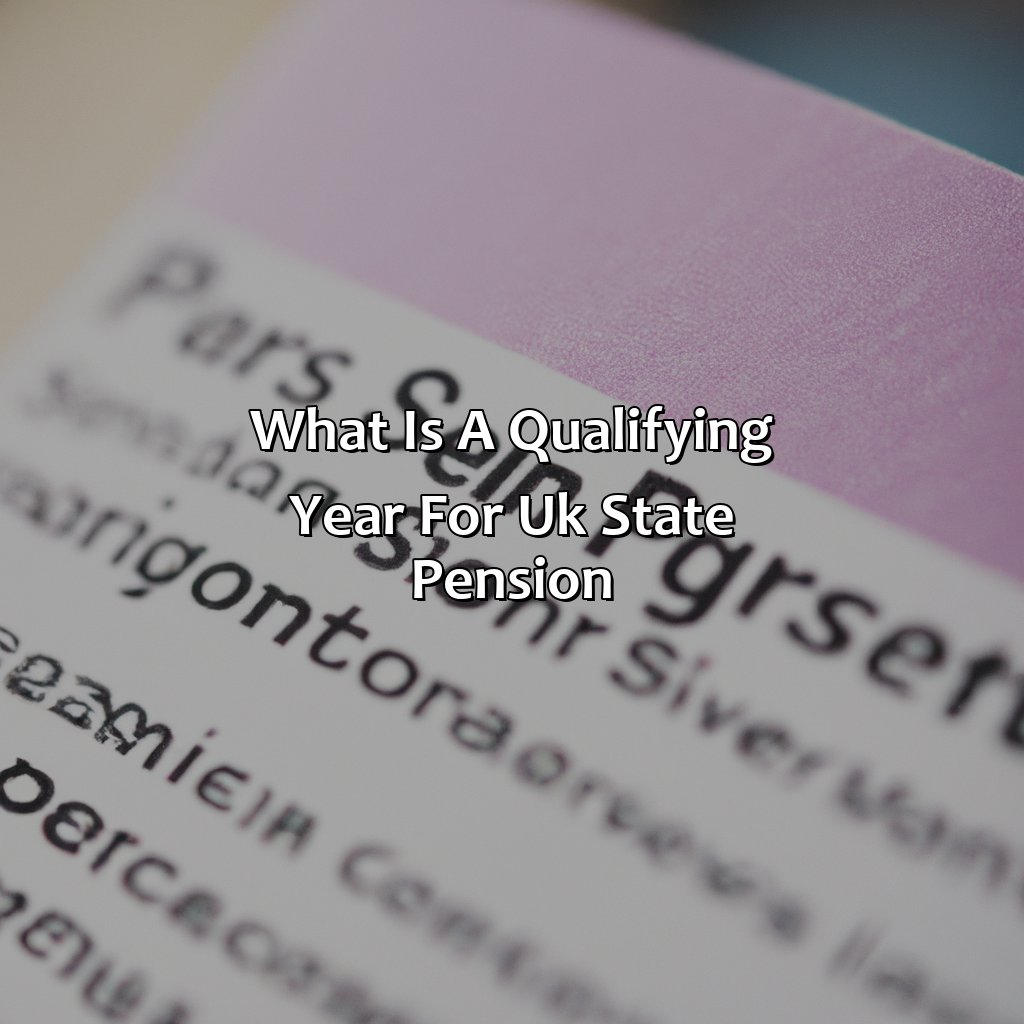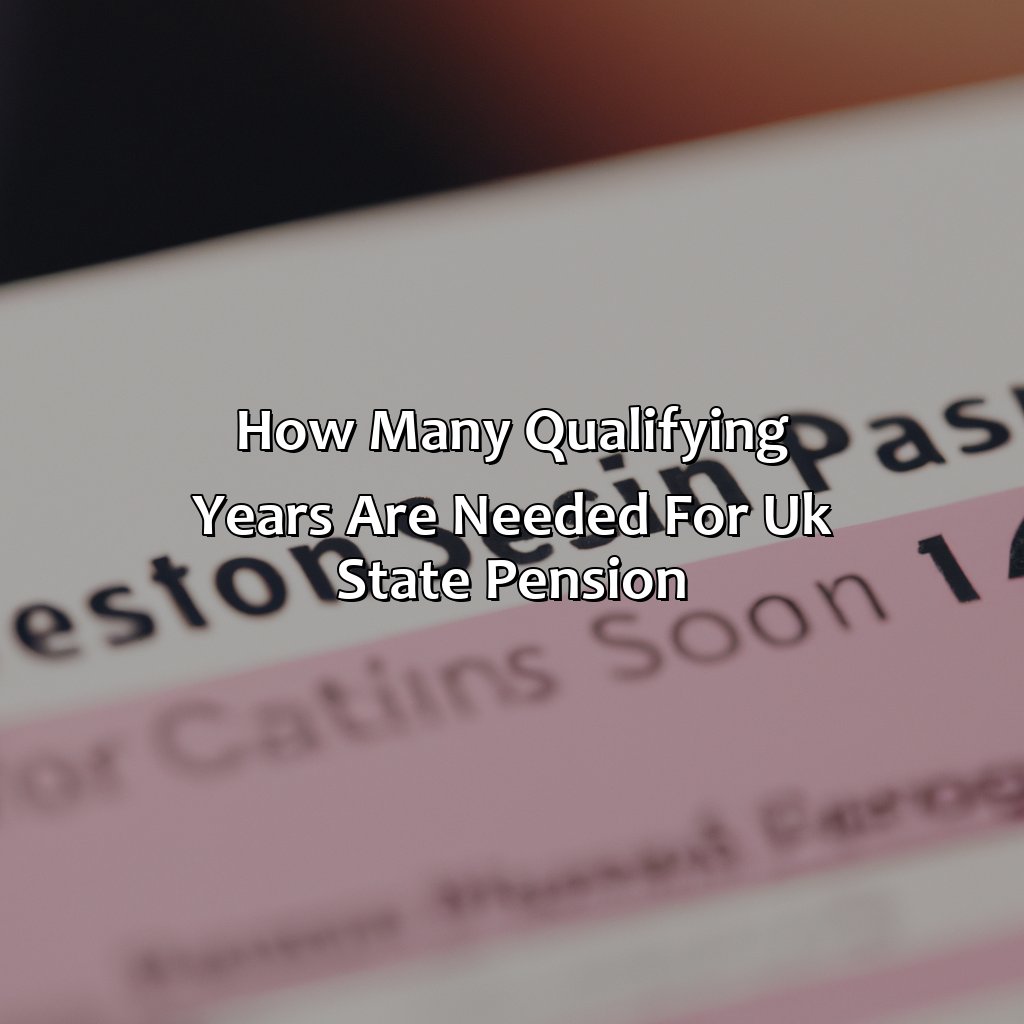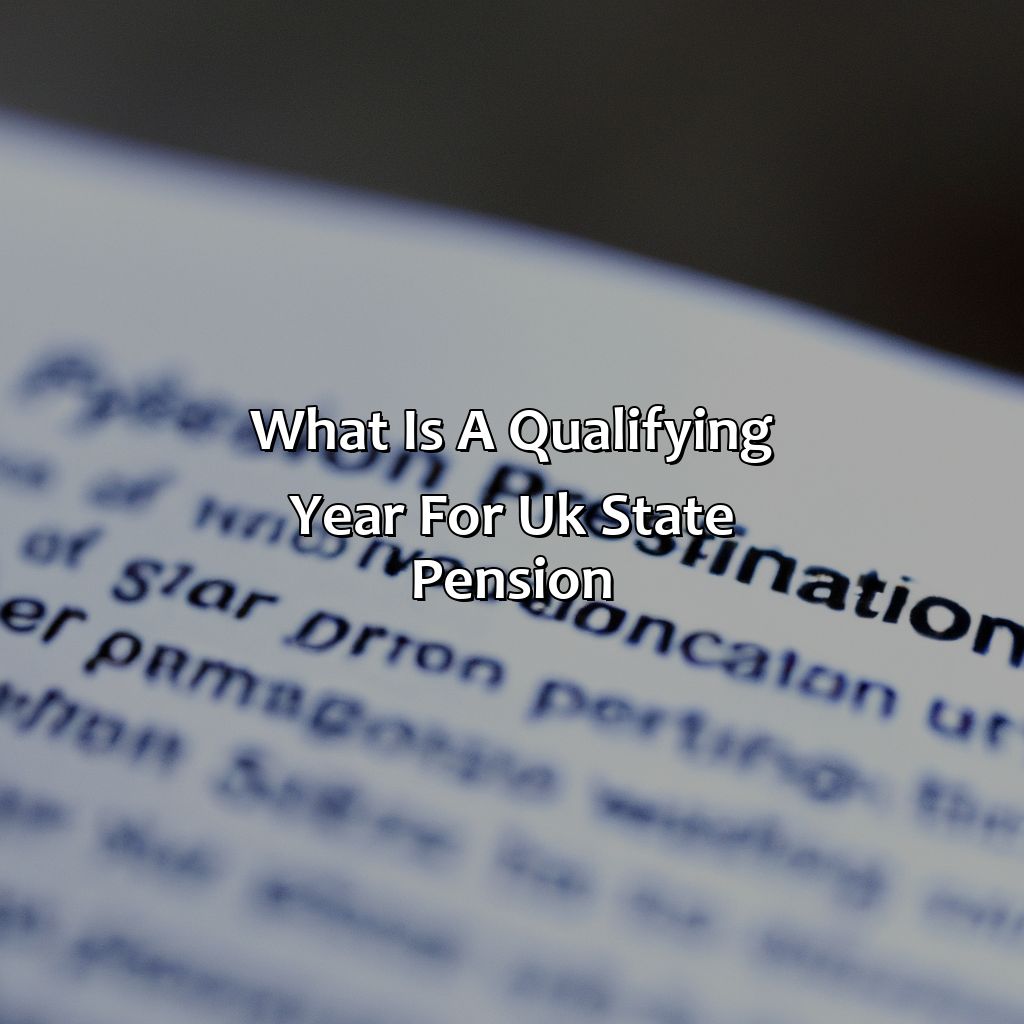What Is A Qualifying Year For Uk State Pension?
Key Takeaway:
- A qualifying year for UK state pension is a year of contributions towards National Insurance or certain credits that count towards state pensions.
- To earn a qualifying year, an individual needs to earn a minimum amount of money or receive qualifying credits.
- The number of qualifying years needed for UK state pension depends on the type of pension an individual is eligible for. Currently, for the full new state pension, 35 qualifying years are needed, while for the basic state pension, 30 qualifying years are needed.
Are you wondering if your UK working years will qualify you for state pension? Then look no further. This article will help you understand qualifying years, state pension calculation and eligibility. You can be rest assured that your hard work will pay off!
What is a Qualifying Year for UK State Pension?
Do you need to know what counts as a “qualifying year” for your UK State Pension? This section will explain it to you. It’s called “What is a Qualifying Year for UK State Pension?“. It’ll give you a brief explanation. There are two sub-sections:
- “Definition of a Qualifying Year“
- “How Qualifying Years are Earned“
These will give you more detail.

Image credits: retiregenz.com by Harry Washington
Definition of a Qualifying Year
A qualifying year is a tax year in which you earn enough to receive state pension credits. In the UK, you need at least 10 qualifying years to receive any state pension and 35 to receive the full amount. To qualify, you must have paid National Insurance contributions or received certain benefits, including Carer’s Allowance or Jobseeker’s Allowance. The qualifying years do not have to be consecutive; they can be scattered across your working life. Meeting the criteria of a qualifying year for UK state pension will ensure that you are eligible for receiving money when you retire.
Time is money, but in the UK, it’s also a requirement for earning qualifying years towards your state pension.
How Qualifying Years are Earned
To meet the criteria for UK State Pension, one needs to earn qualifying years. These are accumulated by paying National Insurance contributions or receiving credits. A qualifying year during employment requires a minimum yearly salary while self-employed individuals need to pay Class 2 and Class 4 contributions respectively.
In addition, some qualifying years may be acquired through benefits such as Jobseeker’s Allowance, Maternity Allowance or Child Benefit. Moreover, individuals who live or work abroad may qualify for the pension if they have paid social security contributions in that country.
It is worth noting that not all years of contribution count towards the minimum of 10 qualifying years required for pension benefits. The earning threshold as well as missed payments will also affect whether one accumulates a qualifying year or not.
Interestingly, the concept of State Pensions originated in Germany in 1889 when Otto von Bismarck introduced it to promote social welfare and combat socialism. Its introduction was followed by Denmark which became the first country to have universal non-contributory pensions in 1891.
How many qualifying years? Enough to make you wish you started working before you were born.
How Many Qualifying Years are Needed for UK State Pension?
If you want the UK state pension, you need to have enough qualified years of National Insurance contributions. We made it easier for you by classifying the qualifying years for the Full New State Pension and Basic State Pension. So, you can work out how many years you must have to get your desired pension.

Image credits: retiregenz.com by David Washington
Full New State Pension
To receive a complete state pension, an individual should have made qualifying contributions for a minimum of 35 years under the Full New State Pension system. These contributions could include payments from employment, self-employment or National Insurance credits. This only applies to people reaching state pension age on or after April 6, 2016.
Furthermore, it is crucial to have at least ten years of contributions to qualify for any type of state pension payment. The New State Pension plan replaces the previous two-tiered scheme and entitles individuals who have generated enough qualifying years post-April 6, 2016, to £179.60 per week.
It is essential to remember that years with low income or no income due to various causes can affect the number of qualifying years earned before April 6, 2016. These may include unemployment and caring responsibilities for children or adults.
Who needs a basic state pension when you can just rely on your collection of cat memes to provide for your retirement?
Basic State Pension
The minimum qualification for obtaining the State Pension in the UK is known as the Initial Basic State Pension. To qualify, an individual needs to have accumulated a certain number of National Insurance contribution years.
These qualifying years are the working years during which one made National Insurance contributions. At present, individuals need to have earned 35 qualifying yearly contributions to apply for a full state pension. However, fewer yearly contributions may still give one entitlement to a partial amount.
It is worth noting that some people can achieve credit for their yearly contributions even if they didn’t work or pay National Insurance themselves. For instance, those who claim Child Benefit or receive Carer’s Allowance may be able to earn credits towards their State Pension too.
According to research by Which? and Now Pensions, from April 2016 onwards, those born after April 6th, 1953 require to have at least ten more qualifying years than their predecessors had needed before drawing a full UK state pension. (Source: The Telegraph)
Sorry non-UK residents, it seems you’ll have to wait a bit longer for that coveted state pension – qualifying years don’t include all the years you’ve spent binge-watching British TV shows.
Qualifying Years for Non-UK Residents
Do you want to know if you qualify for the UK state pension, even if you’re not a UK resident? This section explains the details. It covers agreements between the UK and other countries, plus voluntary national insurance contributions. These sub-sections are important for eligibility. Read on for more information.

Image credits: retiregenz.com by Joel Duncun
Agreements between the UK and Other Countries
Various international agreements have been established between the United Kingdom and different countries worldwide. These agreements allow individuals to accumulate qualifying years towards their UK state pension entitlement despite not living or working in the United Kingdom throughout their lives.
The following table outlines the countries that have a social security agreement with the UK, along with essential details such as the type of agreement and how long an individual must pay contributions to each country’s social security system to be eligible for benefits:
| Country | Type of Agreement | Duration of Contributions |
|---|---|---|
| Australia | Agreement | 10 Years |
| Barbados | Agreement | 10 Years |
| Bermuda | Agreement | 10 Years |
| Canada | Agreement | Varying |
| Chile | Agreement | 12 Months |
It is crucial to note that different qualifying criteria apply, and individuals are advised to seek consultation from official sources before applying for any international agreements.
Avoiding any errors in contribution payments or decision-making based on unclear information can impact future income levels during retirement significantly.
Individuals who intend to move or work abroad should ensure that they are familiar with the qualifying criteria for UK state pension entitlement. It is also advisable to contribute regularly to ensure they maximise their entitled benefits.
Can’t afford a private pension plan? Just make voluntary national insurance contributions and hope for the best. It worked for my uncle, until he forgot to pay for two years and ended up living off cat food.
Voluntary National Insurance Contributions
One way to increase the number of qualifying years for UK state pension is through discretionary contributions to National Insurance. These voluntary contributions can be paid by individuals who have gaps in their National Insurance record or do not meet the minimum threshold for contribution. However, there are specific rules and regulations that must be followed, and certain conditions need to be met to qualify for such payments.
Voluntary payments can only be made if an individual has any gaps in their National Insurance record for certain years. The contribution amount depends on how many gaps exist, as well as a person’s earnings. To check eligibility, one can review a personal statement of state pension or visit a local Jobcentre Plus office.
It is essential to note that voluntary contributions may not always guarantee a full state pension; therefore, individuals seeking further clarification can contact HM Revenue and Customs (HMRC). Additionally, Class 3 voluntary NI contributions are typically more expensive than Class 2.
To ensure that these voluntary contributions do contribute towards qualifying years, it is necessary to double-check with HMRC before making any payment. It will help avoid any confusion or disappointments later down the line.
Counting your qualifying years for state pension is easier than counting sheep, but don’t do it while driving or operating heavy machinery.
How to Check Your Qualifying Years
Check your UK state pension qualifying years with State Pension Forecast. Provide details to get an estimate of your pension. Requesting a National Insurance Record allows you to view your entire work history. Verify if you have the right number of qualifying years.

Image credits: retiregenz.com by Harry Washington
State Pension Forecast
When it comes to your UK State Pension, knowing how to check your qualifying years is essential. This determines the amount and dates when you can receive payments. You can obtain a State Pension Forecast by visiting the government website or contacting the Pension Service directly.
It is important to note that not all years count towards your qualifying years for the State Pension. The number of qualifying years also varies depending on when you were born. For example, those born before 6 April 1950 need 30 qualifying years, while those born after 6 April 1978 require a minimum of 35 qualifying years.
To make sure you’re receiving the pension you’re entitled to, regularly checking your qualifying years is crucial. There are various reasons why some may have gaps in their National Insurance record and could potentially miss out if they don’t act now.
Don’t let time pass, check your National Insurance record today and ensure every year counts towards your State Pension entitlements. You’ll want to reap the rewards of all your hard work at retirement age! Get ready to play detective, because requesting your National Insurance record is like trying to find a needle in a complicated bureaucratic haystack.
Requesting a National Insurance Record
To obtain your National Insurance record, you can request a statement online or fill in a form and post it to HM Revenue and Customs. The statement provides an overview of the National Insurance contributions you have made throughout your life.
By checking your National Insurance record, you can determine if you have any gaps in your contributions that may affect your eligibility for the UK State Pension. It is important to check regularly, especially if you have taken career breaks or worked abroad.
In addition to requesting a statement, you can also make voluntary Class 3 payments of National Insurance contributions to fill any gaps in your record. This can boost your pension entitlement.
I once knew someone who discovered they had several years missing from their National Insurance record. By making voluntary contributions, they were able to ensure they had enough qualifying years for the full State Pension.
Five Facts About UK State Pension Qualifying Year:
- ✅ A qualifying year is a tax year where you have paid or been credited with enough National Insurance contributions to build up your entitlement to the state pension. (Source: Gov.uk)
- ✅ In the 2021-2022 tax year, you need to have paid or been credited with National Insurance contributions for at least 52 weeks to have a qualifying year. (Source: Which?)
- ✅ You need to have at least 10 qualifying years to get any state pension. (Source: Money Advice Service)
- ✅ To get the full state pension, you need to have 35 qualifying years. (Source: Age UK)
- ✅ If you have gaps in your National Insurance record, you may be able to make voluntary contributions to fill them and increase your number of qualifying years. (Source: Pension Wise)
FAQs about What Is A Qualifying Year For Uk State Pension?
What is a qualifying year for UK state pension?
A qualifying year is a year in which you have paid or been credited with enough National Insurance contributions to meet the eligibility criteria for the UK state pension.
How many qualifying years do I need for the UK state pension?
You need a minimum of 10 qualifying years to receive any UK state pension, and 35 qualifying years to receive the full amount.
Can I make up for missing qualifying years?
Yes, you may be able to make up for missing qualifying years by paying voluntary National Insurance contributions or receiving credits, but there are limits to how many years you can make up for.
What counts as a qualifying year for UK state pension?
A qualifying year is a year in which you are either employed and earning over a certain amount, self-employed and paying Class 2 National Insurance contributions, receiving National Insurance credits (e.g. for caring for a child) or paying voluntary National Insurance contributions.
Can I receive a UK state pension if I have lived and worked abroad?
Yes, you may still be able to receive a UK state pension if you have lived and worked abroad, but you will need to have paid enough National Insurance contributions (or received enough credits) in the UK, or in certain other countries with which the UK has a social security agreement.
When will I receive my UK state pension?
The age at which you will receive your UK state pension depends on your date of birth, and may be different for men and women. You can use the UK government’s online state pension age calculator to find out exactly when you will become eligible.
